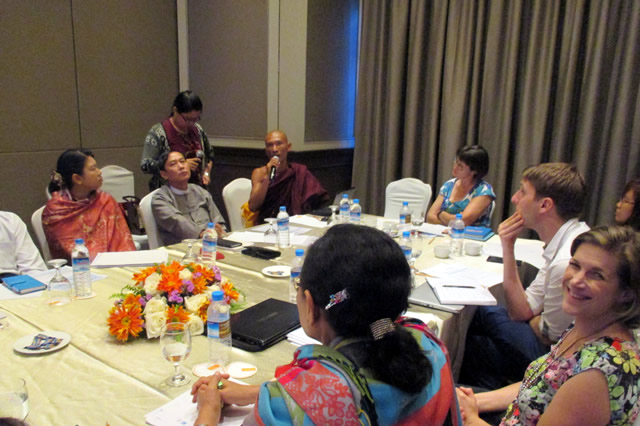MCRB Convenes Multi-Stakeholder Meeting on Thilawa Special Economic Zone

Myanmar Centre for Responsible Business convened a meeting on 19 February at Chatrium Hotel Yangon to bring together a number of company, civil society, government and international NGO organisations and individuals who are involved in the Thilawa Special Economic Zone Phase 1 Project.
MCRB convened the meeting at the request of a number of the stakeholders in the Project in line with its mandate of providing a neutral platform for dialogue on responsible business in Myanmar and raising awareness about and encouraging the application of international standards.
The meeting was attended by representatives of the Thilawa SEZ Management Committee, Myanmar-Japan Thilawa Development Co, Paungku, Earthrights International, Shwe Hmaw Won (Kyauktan-based community organisation), International Alert, International Physicians for Human Rights, JICA Expert team/Nippon Koei, TWA Consultancy, Social Clarity and Reeman Consulting. The meeting was also graced by the attendance of local religious leader, Sayadaw U Sandawara, Patron of Shwe Hmaw Won. All meeting participants share the common objective of ensuring the Zone’s successful implementation in line with international standards, particularly as concerns resettlement and addressing the impacts of communities affected by the project. Furthermore they recognise that to avoid further misunderstanding, a continuous dialogue between the communities and government is essential.
Meeting participants shared information about their priorities, plans and concerns, with a focus on the situation of the project-affected people who have been resettled as a result of Phase I of the SEZ programme. TWA presented the results of the third party monitoring survey which took place in October 2014 and surveyed household incomes and situations in comparison with comprehensive baseline data gathered in 2013 prior to the resettlement. This report will be available shortly from the SEZ website (http://myanmarthilawa.com).
The JICA Expert presented the Sustainable Livelihood Approach underlying the Income Restoration Programme (IRP). The SEZMC representative updated on investment progress in the Zone. To date, 35 companies had expressed interested, 15 had received permits and 2 factories had started to build foundations. The Zone currently employed 1600 workers of whom over 10 were from the project-affected communities
Particular issues highlighted were:
-
the need for the rapid roll-out of the planned enhancements of the Income Restoration Programme (IRP), designed by JICA Expert Team/Nippon Koei in consultation with civil society groups who work with the communities, and to be presented to the affected people on 20 February for feedback. This will consist of:
- a Social Welfare Support Programme, which includes conditional requirements to work and/or participate in training, except where this is impossible for vulnerable households, so as to avoid dependency
- access to a Community Development Fund, and
- targeted support to the most vulnerable households
- job matching support
-
the need for urgent action to be taken to address:
- acute indebtedness of some households
- drainage problems in the resettlement area to prevent a resumption of monsoon flooding; Nippon Koei have a works programme underway to address this problem
-
the importance of the SEZ Management Committee actively encouraging incoming investors into the Zone to employ project-affected people and host communities in their operations, and to contribute to community investment for the area in a coordinated manner which reflects community needs. Community Development Fund might become a vehicle for this
-
the importance of consistent and transparent land
-
the acquisition and compensation practice in different projects currently underway or proposed in the Thilawa area, including at the Port and for Phase 2
-
the importance of all those involved in working in good faith towards ensuring the restoration and improved of livelihoods of those affected by the project
-
a desire on the part of civil society for more information about the Zone, including about individual investors
-
the importance of recognising the historical problems associated with the land acquisition in what is now the Special Economic Zone, which dated back to 1996/1997, the complexity of land ownership and use at the time and subsequently, and the influence these events have on the grievances raised by the project-affected communities in 2015. Earthrights circulated their legal analysis of this
-
the importance of learning lessons from the experiences of the Phase 1 resettlement, including on the consultation and disclosure, design of income restoration programmes, particularly for the most vulnerable households, and municipal works, and consideration of the needs of host communities as well as those resettled, and applying these to Phase 2 in a proactive manner
The meeting agreed on the value of continued multistakeholder engagement. They discussed a proposed model for establishing an independent Multistakeholder Advisory Committee (MAC) drawing on members from the organisations present and others with an active interest. This could undertake deeper investigation of issues such as those highlighted above, particularly where other avenues were unable to resolve problems. It could provide advice to the SEZ Management Committee.
Participants also discussed how this Advisory Committee would interact with a community-designed grievance mechanism which Earthrights International is assisting the communities to design to meet their needs. The meeting also noted that in resettlement programmes in other countries, there had been value in the appointment of a ‘Trusted Third Party’ who could act as an independent monitor of the resettlement programme (see for example page 72-73 of the IFC’s Good Practice Handbook on Stakeholder Engagement). Such a Trusted Third Party would naturally be a member of the Advisory Committee.
MCRB will follow up with a proposal to participants to constitute such a multistakeholder advisory committee with the aim of holding the first meeting within a month.
 English
English မြန်မာ
မြန်မာ မြန်မာ (unicode)
မြန်မာ (unicode)










